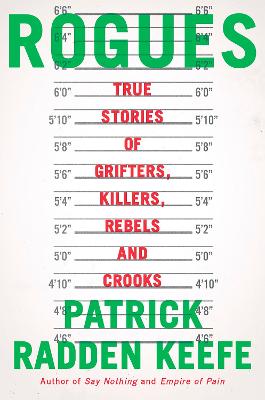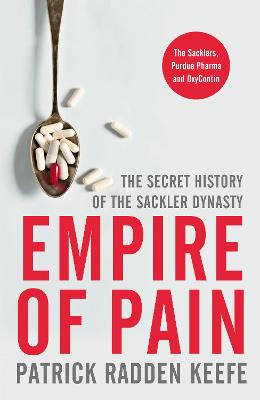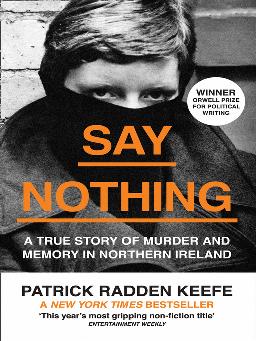Tūranga's own Tautoru / TSB Space has been turned into The Faraway Near for the WORD Christchurch Festival, and I'm loving the 80s disco aesthetic, the yummy food & drinks by Foundation Cafe, and sharing a table with friends and friendly people. And, of course, the rare chance to get up close and personal with some of the world's best writers. I was stoked to meet New Yorker journalist Patrick Radden Keefe, author of Empire of Pain and Rogues. I've read both, and they are such powerful reads that I now intend to hoover up everything else he has written. Patrick was in conversation with Guyon Espiner, no slouch in the investigative journalist stakes himself.

This session kicked off with a dive into Rogues, his compilation of 12 stories from the last 12 years. I've just finished reading it, and lent it to my Dad. It's a cracking read. One story called "Winning" is about reality tv guru Mark Burnett, creator of Survivor and - ahem - The Apprentice. Could this English reality tv director - a "pretty shallow and unreflective person" - be to blame for Trump? Patrick is categorical - Yes. There is no Trump presidency without Burnett. Before his 16 seasons of The Apprentice, Trump was a local figure, a joke, a punchline. A serial bankrupt carnival barker. But - Patrick takes a sip from a glass of red - reality tv took a court jester and dressed him up as a King,
Trump is a boundary-pushing, norm-desecrating kind of guy, and there are other leaders of his ilk, more entertainers than politicians (Boris Johnson much?).
Patrick is not afraid of the writearound - creating a story without interviewing the leading character. He didn't talk to Mark Burnett - but he talked to two ex-wives, numerous colleagues and staffers, and got more than enough insight by that means:
Access is overrated in journalism.

Guyon and Patrick discuss another story in Rogues, The Empire of Edge about a young portfolio manager Mathew Martoma, his billionaire boss, and an elderly doctor who shares information about clinical trials. It's a story with "operatic bones" - the young go-getter and the doctor who is reminded of his young son who committed suicide.
The other Rogues story discussed is El Chapo. Patrick's New Yorker piece got the attention of El Chapo's colleagues, leading to an offer Patrick could refuse - writing the famous drug lord's biography.
From illegal drugs to the legal. Empire of Pain, Big Pharma - unlike the drug cartels, and people in American prison for minor drug offences - escapes criminal justice. There have been other books on the opioid crisis, but Patrick took on the dynastic aspect of the Sackler family and Purdue Pharma. Arthur Sackler was the OG of the dynasty; he practically invented medical advertising and the corrupt circle jerk of promoting pharmaceuticals to doctors. He was a great mid-century hustler, the paradigm of the American Dream. In one generation you can go from immigrant to having your name on wings in MOMA, the Guggenheim, the Louvre... but there's an amorality to the American Dream, and people suffer.
Patrick writes in an intimate way, and wants it to feel as if he was in the room with these people. He got access to emails and a family WhatsApp chat - his training as a lawyer stands him in good stead for discovery. As does his desire to find and tell good meaty stories:
Everything is found art ... you look under a rock and see what you find.
As a writer, I'm thinking about myself as a reader,
We move onto Patrick's famous podcast Wind of Change. It stems from the compelling premise "Did the CIA write a power ballad that ended the Cold War?" and the most kickass podcast tagline "Spies. Secrets. Soviets. And tight leather pants." He went with the podcast format for this story because the podcast form is a celebration of doubt. He saw the Scorpions concert in Kiev in 2019 - people were crying during 'Wind of change'. The song has an incredible impact and it felt raw and real to Ukrainians. It's become an anthem again since the Russian invasion. And Patrick is off to a Scorpions concert next week.
Say Nothing was the next of Patrick's books to be discussed. He learned about Dolours Price the first woman in the IRA, and realised he only knew of the Troubles as a totally male story. Then he heard about Jean McConville, a mother of ten, was abducted from her home in Belfast in 1972 and was never seen alive again. He is drawn to these human stories.
We round back to journalism and its future, as a discussion between two great journalists inevitably must. People will read 10,000 word New Yorker articles on their mobile phones it seems. Which is good for journalism. But Patrick has concerns, Social media leads to stovepiped realities, and curated information ecosystems. The business model of journalism is also a concern. It takes money to do deepdiving stories like his.
On to the audience questions! How was it being in a podcast? It is more intimate, you are a character in it, and with 10 million listeners plus it's the biggest audience for Patrick. He thinks it's incredibly cool that people move onto his audiobooks after doing the podcast. He loves narrating his own works.
He recommended his faves: the movies Spotlight and All the President's men, fellow New Yorker writers Lawrence Wright, Jane Mayer, and David Grann. Plus a hot podcast tip - West Cork.
Photos from the Patrick Radden Keefe session
READ
Books by Patrick Radden Keefe
LISTEN
Patrick Radden Keefe talks to Kim Hill:
Patrick Radden Keefe: collectiing criminals and con artists for new book Rogues 6 August 2022
The Sackler famiily's opioid 'Empire of Pain' 1 May 2021
WORD Christchurch Festival 2022 Coverage
Visit our page of WORD 2022 Festival coverage and info
WORD Christchurch information
- Visit the WORD Christchurch website
- Follow @wordchch on Twitter
- Like @wordchch on Facebook
- Follow @wordchch on Instagram








Add a comment to: Operatic Bones and Human Stories – Patrick Radden Keefe: WORD Christchurch 2022